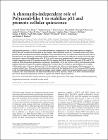| dc.contributor.author | Mc Lysaght, Aoife | en |
| dc.contributor.author | Bracken, Adrian | en |
| dc.contributor.author | Martin, Seamus | en |
| dc.date.accessioned | 2016-06-23T12:33:30Z | |
| dc.date.available | 2016-06-23T12:33:30Z | |
| dc.date.issued | 2015 | en |
| dc.date.submitted | 2015 | en |
| dc.identifier.citation | Brien GL, Healy E, Jerman E, Conway E, Fadda E, O'Donovan D, Krivtsov AV, Rice AM, Kearney CJ, Flaus A, McDade SS, Martin SJ, McLysaght A, O'Connell DJ, Armstrong SA, Bracken AP, A chromatin-independent role of Polycomb-like 1 to stabilize p53 and promote cellular quiescence., Genes & Development, 29, 21, 2015, 2231-43 | en |
| dc.identifier.issn | 0890-9369 | en |
| dc.identifier.other | Y | en |
| dc.identifier.uri | http://hdl.handle.net/2262/76636 | |
| dc.description | PUBLISHED | en |
| dc.description.abstract | Polycomb-like proteins 1-3 (PCL1-3) are substoichiometric components of the Polycomb-repressive complex 2 (PRC2) that are essential for association of the complex with chromatin. However, it remains unclear why three proteins with such apparent functional redundancy exist in mammals. Here we characterize their divergent roles in both positively and negatively regulating cellular proliferation. We show that while PCL2 and PCL3 are E2F-regulated genes expressed in proliferating cells, PCL1 is a p53 target gene predominantly expressed in quiescent cells. Ectopic expression of any PCL protein recruits PRC2 to repress the INK4A gene; however, only PCL2 and PCL3 confer an INK4A-dependent proliferative advantage. Remarkably, PCL1 has evolved a PRC2- and chromatin-independent function to negatively regulate proliferation. We show that PCL1 binds to and stabilizes p53 to induce cellular quiescence. Moreover, depletion of PCL1 phenocopies the defects in maintaining cellular quiescence associated with p53 loss. This newly evolved function is achieved by the binding of the PCL1 N-terminal PHD domain to the C-terminal domain of p53 through two unique serine residues, which were acquired during recent vertebrate evolution. This study illustrates the functional bifurcation of PCL proteins, which act in both a chromatin-dependent and a chromatin-independent manner to regulate the INK4A and p53 pathways. | en |
| dc.format.extent | 2231-43 | en |
| dc.language.iso | en | en |
| dc.relation.ispartofseries | Genes & Development | en |
| dc.relation.ispartofseries | 29 | en |
| dc.relation.ispartofseries | 21 | en |
| dc.rights | Y | en |
| dc.subject | PHD reader domain | en |
| dc.subject | Polycomb-like | en |
| dc.subject | cellular quiescence | en |
| dc.title | A chromatin-independent role of Polycomb-like 1 to stabilize p53 and promote cellular quiescence. | en |
| dc.type | Journal Article | en |
| dc.contributor.sponsor | Science Foundation Ireland (SFI) | en |
| dc.type.supercollection | scholarly_publications | en |
| dc.type.supercollection | refereed_publications | en |
| dc.identifier.peoplefinderurl | http://people.tcd.ie/mclysaga | en |
| dc.identifier.peoplefinderurl | http://people.tcd.ie/brackea | en |
| dc.identifier.peoplefinderurl | http://people.tcd.ie/martinsj | en |
| dc.identifier.rssinternalid | 107457 | en |
| dc.identifier.doi | http://dx.doi.org/10.1101/gad.267930.115 | en |
| dc.rights.ecaccessrights | openAccess | |
| dc.contributor.sponsorGrantNumber | SFI PICA SFI/10/IN.1/B3002 | en |
| dc.subject.TCDTheme | Cancer | en |
| dc.subject.TCDTheme | Genes & Society | en |
| dc.subject.TCDTag | EVOLUTION | en |
| dc.subject.TCDTag | Genomes, Genomics | en |
| dc.subject.TCDTag | Molecular Biology | en |
| dc.identifier.orcid_id | 0000-0003-2552-6220 | en |




